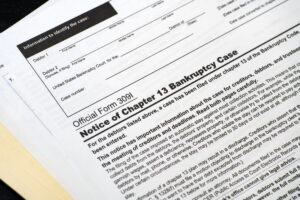
I can’t think of a more powerful, effective tool in eliminating overwhelming debt than the one provided in United States’ Bankruptcy Code. No tool will get a person on the road to financial recovery after they’ve been hit by unforeseen debt faster than bankruptcy. In fact, bankruptcy can be the answer to the question of whether or not you can eliminate a debt for the overpayment of public benefits.
There are limits to this tool, however. Bankruptcy generally can’t eliminate recent income taxes (or payroll taxes), child support or spousal maintenance, (most) student loans, and court or government-imposed fines.
Colorado bankruptcy court Judge Rosania recently issued an opinion in Douglas County Department of Human Services v. Rioux that highlights another limit to bankruptcy’s power: where the debtor has engaged in fraud. A bankruptcy filer who has engaged in fraud to obtain credit will not be able to eliminate that debt. Wondering if you can eliminate a debt due to the overpayment of public benefits? Read on!
How Bankruptcy Can Eliminate A Debt For Overpayment Of Public Benefits
Sections 523(a)(2)(A) and 523(a)(2)(B) exclude from discharge debts that are obtained through “false pretenses, a false representation, or actual fraud, other than a statement respecting the debtor’s or an insider’s financial condition” or through the use of “a statement that is in writing that is materially false; respecting the debtor or an insider’s financial condition; on which the creditor to whom the debtor is liable for such money, property, services, or credit reasonably relied; and that the debtor caused to be made or published with the intent to deceive.”
It’s important to note the distinction between sections 523(a)(2)(A) and (a)(2)(B). Most significantly, (a)(2)(B) relates to false statements that are made in writing regarding a debtor’s financial condition. This could be misstating one’s income or assets, or since it also applies to “insider’s” could include misstating one’s spouse’s income or assets on a credit application.
Section 523(a)(2)(A), though, doesn’t require any writing. It merely requires that the debtor make a false representation with the intent to deceive the creditor; that the creditor relied on the false representation; that the creditor was justified in relying on the representation; and that the false representation resulted in damages to the creditor. So, a verbal statement could be sufficient to establish fraud.
Ms. Rioux applied for, and received, food and Medicaid benefits from the Douglas County Department of Human Services (“DHS”). DHS based her award of those benefits on certain information Ms. Rioux gave them about her income and members of her household. After Ms. Rioux received those benefits, DHS discovered information that appeared to contradict the information she provided in her application for benefits and demanded that she repay those benefits.
After Ms. Rioux filed a Chapter 7 bankruptcy petition, DHS filed an adversary proceeding, asking the bankruptcy court exclude the debt for overpayment of benefits from the discharge of her debts. DHS claimed the amount Ms. Rioux was overpaid was $6,521.10. Once an adversary proceeding is filed, the defendant (Ms. Rioux in this case) has three options: fight the lawsuit, settle the lawsuit, or ignore the lawsuit. To be clear, ignoring the lawsuit means that the debt will be nondischargeable and the the plaintiff (DHS in this case) will be able to collect the debt after the underlying bankruptcy is discharged. Fighting the lawsuit can mean additional legal fees and one should do a cost-benefit analysis to see if fighting the debt is worth the expense.
Ms. Rioux decided to fight the lawsuit. The court conducted a two-day trial at which DHS staff, Ms. Rioux, and Ms. Rioux’s common law husband testified. The primary issue is whether or not Ms. Rioux was married and had misrepresented her household composition. Ms. Rioux argued that she was not married. DHS argued that Ms. Rioux was married under Colorado’s common law marriage rules.
The trial included evidence of a joint tax returns, employment records showing she changed her last name to that of her husband’s, and that Ms. Rioux and her husband leased a home together, and purchased a vehicle together. To everyone other than DHS, she presented herself as married. She should have disclosed her marriage and her husband’s income to DHS when applying for benefits.
Bankruptcy Can Not Eliminate A Debt For Public Benefits Where They Were Obtained Through Fraud
The court found that Ms. Rioux engaged in fraud and that her debt to DHS should not be discharged. This opinion only affects this specific debt since the court found that the filer engaged in fraud with this specific creditor. The rest of Ms. Rioux’s dischargeable debts were eliminated.
While this case is instructive for the elements of fraud, in Colorado it’s also useful for defining a common law marriage. It’s possible for a bankruptcy case to be dismissed if a filer engages in fraud against the court, or, in certain situations fraud against specific creditors in certain situations. When you file bankruptcy, the information you provide must be accurate and honest. There are severe penalties for lying. Your case can be dismissed. You can go to jail.
Claiming that you are single on your bankruptcy petition when you have claimed to be married in other contexts can have serious consequences. Marital status and household income (which includes the income of a spouse even if he or she isn’t filing bankruptcy) affects whether or not someone is eligible for a Chapter 7 bankruptcy or how much a filer has to pay their unsecured creditors in a Chapter 13 bankruptcy repayment plan. If you claimed to be single on your application for public benefits, and then claim to be married on your bankruptcy petition, you may have just stepped into a big puddle of trouble.
Talk To An Experienced Bankruptcy Attorney In Denver, Colorado About Eliminating A Debt For Overpayment of Public Benefits
As you can see, whether or not you can eliminate a debt for the overpayment of public benefits rests heavily on your specific facts. If you’d like to learn more about whether bankruptcy can help you eliminate an obligation to repay public benefits, we’d be happy to talk with you. Our initial consultations are free. The easiest way to schedule an appointment with an top-rated Colorado bankruptcy attorney is by scheduling an appointment here.
Check out our Google and Avvo pages for reviews from our great clients!


